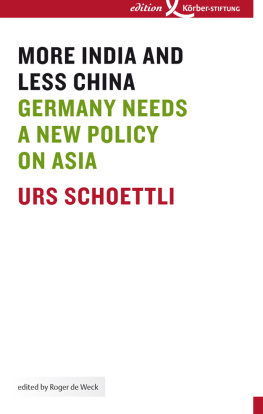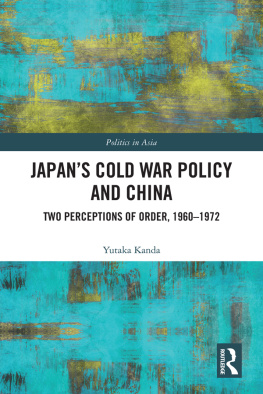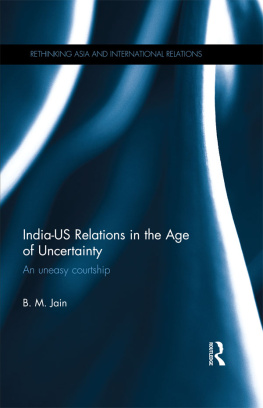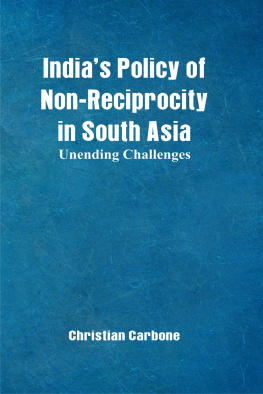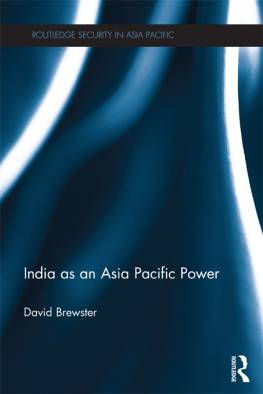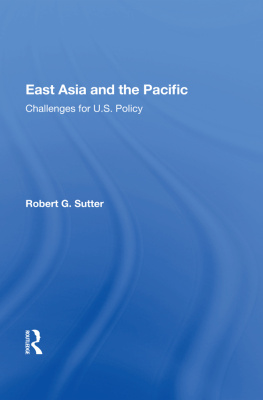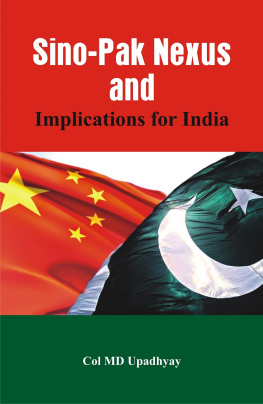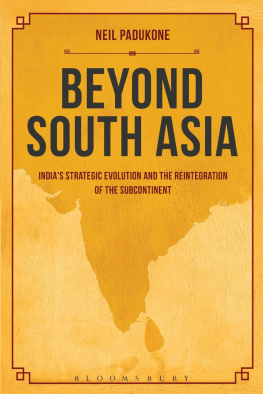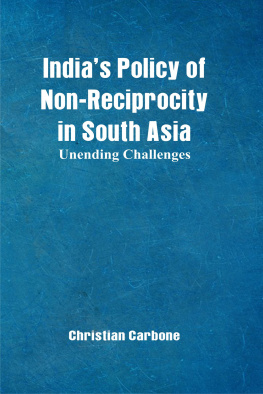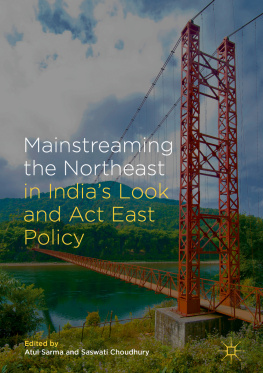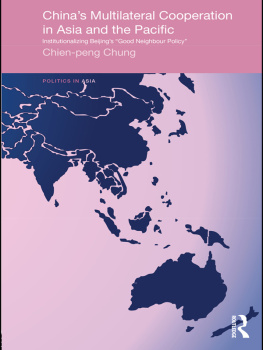More India and Less China
Germany Needs a New Policy on Asia
Urs Schoettli
Translated by Alfred Clayton
Preface
Neither Rival Nor Stakeholder
At the recent World Economic Forum in Davos, India demonstrated its self-confidence with the help of a giant poster on which beaming young Indian men and women proudly proclaimed that their country had the worlds largest reservoir of talent. In 2011 something unexpected is going to happen, and it will be a quiet revolution. The World Bank has predicted that for the very first time India will have stronger economic growth than China.
This certainly does not mean that the subtle balance between the two Asian great powers is suddenly going to change. Thus the Peoples Republic of China is pursuing a global strategy that is not restricted to natural resources. For example, it includes giving financial aid to EU states overburdened by debt. India has not (as yet?) entered the fray. As far as Washington is concerned, its relationship with Delhi is not the same as its relationship with Beijing. The Peoples Republic of China and the United States may be rivals, but their interests are interwoven and intertwined. India, on the other hand, is neither a rival nor a stakeholder of the US. And that in fact is a good sign. A confrontation between India and the West seems unlikely. In contrast to this a tussle between America and China across the Pacific is a real possibility, and perhaps it is the most dangerous one in the global politics of the 21 st century.
And what are the Europeans and the Germans making of all this? They continue to be mesmerized by Chinas swift success, and for this reason many people have underestimated Indias more laborious and yet more confidence-inspiring upward trajectory. The country is the largest democracy in the world. Its political system is based on the rule of law. It shares more values with the West than the Peoples Republic of China. And India has what the much-admired Beijing dictators tend not to have: the candour to talk about things which have gone wrong, and the willingness to discuss the subject of poverty and corruption.
Sooner or later China will be faced with a political caesura and all the uncertainties that it entails. Much seems possible: a gradual transition to democracy, rioting, or systemic collapse. India is different. It is the country of peaceful evolution. The political risks facing investors are much smaller. How can one adequately assess economic and political risks in a country where, as in the case of China, there is unchecked one-party rule and totalitarian surveillance of the media? asks Urs Schoettli, who is someone who knows both countries very well. He goes on to cast doubt on Europes economic policies, which occasionally seem rather nave.
Schoettlis nuanced and well-informed case for India is so convincing because it sets the record straight and points the reader in the right direction. In political and economic terms Germany and Europe have every reason to play the Indian card, and to play it with greater conviction. Not only (but also) in order to reduce their dependence on China.
Roger de Weck, Editor of series Standpunkte
Germany Needs a New Policy on Asia
In the recent past India and China have returned with a vengeance to the world stage and the global economy. The two countries, which together have almost 2.5 billion inhabitants, are currently regaining the power and importance which they had before the advent of the Western colonial powers in Asia. At the beginning of the Asian century the Europeans and Americans are having to come to terms with a rearrangement of the poles of global economic and geopolitical power. It has of course been apparent for some time that the Peoples Republic of China in particular has once again become the centre of global attention. Yet the architecture of international cooperation has found it difficult to adapt to the new balance of power. For example, the permanent members of the UN Security Council still reflect to the exclusion of all else the outcome of the Second World War. However, the newly created G 20 group is an institution in which the rising powers are appropriately represented, even though the new initiative has not attained the cohesion possessed by the G 8 group. Neither China nor India are fully-fledged members of the latter.
The new global balance of power is of course a challenge to Germanys policy on Asia. It is clearly apparent that Berlin has understood the new global significance of the Peoples Republic of China, and it treats Beijing with the attention and due respect. On the other hand, India continues to languish in the background. In the German public sphere it is still waiting to be upgraded to the status to which it would seem to be entitled when we consider the economic dynamism it has displayed in the recent past. Whereas China continues to be perceived (and occasionally feared) as a new superpower, India still has the reputation of being a developing country. Recently at least there have been signs of a change of heart in German industry.
China and India are heirs to ancient civilizations of global renown. They are not nation-states in the Western sense, but in every respect political entities of a vast and continental kind. More India and less China is a slogan, the purpose of which is to upgrade the status of India among German foreign policymakers. This cannot be achieved with a simple recital of current economic and geopolitical facts. What is needed is a comprehensive examination of the complex reasons for Indias re-emergence as a world power. Thus in the following chapters we shall on more than one occasion refer to the adversities with which India and China have had to contend during the last two centuries. And we will compare and contrast the different ways in which the two countries have tackled the issue of economic and social modernization.
Our review will focus on the elucidation of the cultural, economic and geopolitical factors which suggest that it would be a good idea if German foreign policymakers were to upgrade the importance of India. We shall first shed light on some important links between European and Indian civilization. Here we are concerned not only with the heritage of British rule in India, which even today is visible in the prevalence of English as the lingua franca of the Indian upper and middle classes and in the nature of the legal system. We will also look at values which have been among the guiding principles that have existed in India since ancient times. They have a great deal in common with our own notions of tolerance and candour. Furthermore, we shall examine common German and Indian interests in South Asia, and especially in the area of the Indian Ocean, which is of such vital importance for world trade. And finally we will set out the arguments in favour of expanded bilateral relations between Germany and India. They are substantiated by the clearly discernible rising trend in Indian-German business links. The aim of this essay is to clarify why, in the context of German policy on Asia, Indias status and significance are set to increase in the years and decades ahead.
A Reappraisal
Over the past two decades the public in the West has become increasingly aware of what is happening in Asia. It is true, of course, that in 1980s Japan advanced to become the second-largest economic power in the world, but at the time the Europeans did not really believe that it was important, at least in geopolitical terms. The Cold War had not as yet come to an end, and the advent of an Asian century was not an issue. All this changed dramatically as a result of Chinas resurgence and new world power status. Deng Xiaoping began with the economic realignment of the Peoples Republic towards the end of the 1970s, but the unprecedented economic rise of China first began to become apparent as the millennium approached. After having suppressed the democracy movement at the beginning of June 1989, the Chinese leadership decided to embark on faster economic growth in order to encourage people to think about something else, and to spare Chinas Communist Party the fate of the Soviet communists under Gorbachev.


